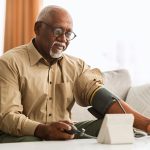-
Forward Look
Have You Checked Your Blood Pressure Lately?New guideline stresses regular blood pressure checks during and after cancer treatment.
by Darcy Lewis
-
Forward Look
Pausing Treatment for PregnancyYoung women who have had hormone receptor-positive breast cancer can safely suspend endocrine therapy to try to have a child.
by Carolyn Bernhardt
-
Cancer Effects on Caregivers and Work
Many stop work or cut hours to care for a loved one with cancer, adding to their financial strain.
by Karon Warren
-
Deconstructing Peripheral Neuropathy and Chemo Brain
Researchers explore mechanisms of chemotherapy-related neurotoxicity at the AACR Annual Meeting 2023.
by Marci A. Landsmann
-
Childhood Cancer Survivors Face Higher Mortality for Decades
An increased risk of early death exists even after treatment for childhood cancer, but survivors also have the potential for decades of life after cancer.
by Sandra Gordon
-
The State of Cancer Care and Pregnancy
An expert panel at the AACR Annual Meeting discussed the difficult choices faced when cancer is diagnosed during a pregnancy and how recent laws have brought additional challenges.
by Eric Fitzsimmons
-
Preventable Emergency Department Visits Trending Upwards for Patients with Cancer
Attentive care can manage conditions that cause patients to seek emergency care, but patients with concerning symptoms should still go to the hospital or urgent care center.
by Sandra Gordon
-
Most Cancer Doctors, Patients Interested in Integrative Care
A nationwide survey found strong support for complementary therapies like massage and meditation, but also significant barriers to access.
by Kyle Bagenstose
-
Healthy Habits
Coffee TimeRecent studies find a cup of joe is associated with reduced risk of endometrial and liver cancers.
by Carisa Brewster
-
Healthy Habits
An Integrative ApproachDerived from traditional Chinese medicine, acupuncture shows benefits for easing cancer-related pain.
by Tyler Santora
Cancer Talk
Lessons From 20 Years Living With Cancer
Multiple myeloma survivor Jonathan Gluck reflects on uncertainty, and the scientific progress that has kept him living with cancer for more than two decades.
by Eric Fitzsimmons
The Enduring Importance of Cancer Disparities ResearchOpening session from AACR conference highlights how perseverance and adversity have informed cancer disparities research over the years.
by Eric Fitzsimmons
Most Cancer Survivors Don’t Meet Healthy Diet GoalsDespite research linking fruits and vegetables to cancer survival, many people do not change their eating habits after diagnosis.
by Darlene Dobkowski
Many People Don’t Get Colonoscopy After Receiving Abnormal Blood TestsAbout half of people who receive abnormal results from colorectal cancer screening tests don’t follow up with a colonoscopy.
by Laura Gesualdi Gilmore















